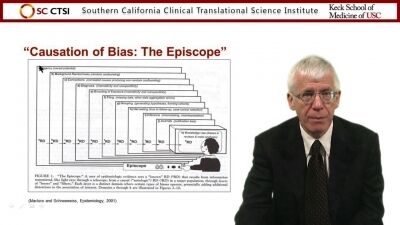In "Bias in Clinical/Translational Research," a lecturer discusses the elements of bias that can impact both validity and value of clinical investigations. The lecturer reviews potential sources of bias that can occur even at the earliest stages of study design, in participant selection and throughout data collection, and in how data is interpreted or reported. Topics covered include information bias, measurement errors, selection bias, identification of confounding variables, and the quality assurance practices to help researchers validate data and adjust for error.
In "Analyzing Data and Interpreting the Results," a lecturer further discusses the process of data analysis in biomedical research, through the process of developing a research question, a hypothesis, and a study design. The lecturer discusses best approaches to coding and presenting data, statistical summaries and analysis, and various types of charts and other data display methods. Hypothesis testing and synthesis of results are also covered.


